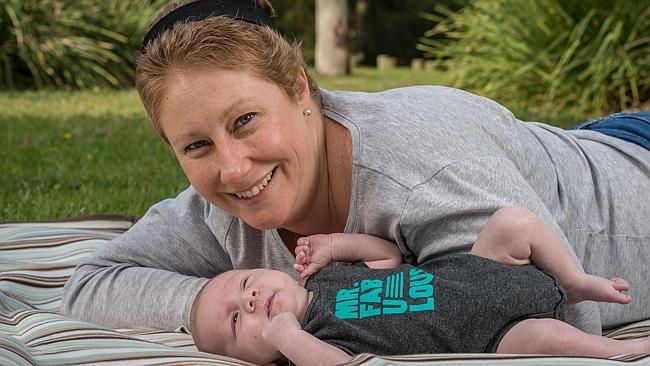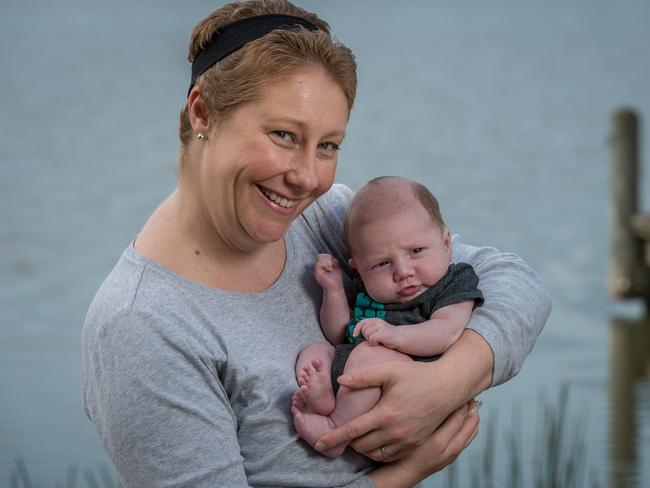Chemotherapy during pregnancy: Melbourne mum’s brave battle to give birth
KATY Reith discovered she was pregnant five days after being diagnosed with cancer. The Sunday Herald Sun followed her eight-month battle through to the birth of her son.

VIC News
Don't miss out on the headlines from VIC News. Followed categories will be added to My News.
LUCKY is a word Katy Reith uses often.
She is lucky that tiredness and hair loss were the worst part of chemotherapy.
She is lucky her lump was so obvious and found early.
She was lucky that she found out she was pregnant before her cancer was found.
“I just think everything happens for a reason,” she said.
“I believe in higher powers, so this was meant to be. There is nothing I can change.”
Katy can’t explain what urged her out of bed at 3am to take a pregnancy test hours before a breast cancer scan.
But staring down at the blue confirmation line she knew she and her unborn baby were in for the fight of their lives.
“I didn’t know what to think,” she said. “Is this good news or bad news? Can I keep this baby?”
Katy and husband Mick had been home from their honeymoon only seven weeks when she found a lump in her breast.
Close to a golf-ball size, it was new, it was big and it was a tumour.
“How does this happen to somebody who’s 37? And finding out I’m pregnant as well; you can’t say both of those things to people in one sentence. People don’t know how to react,” she said.
Katy was determined she could save both her own life and her baby.
“There were a few people trying to talk me out of it,” she said. “Straight up I said to them: ‘This is happening. You need to work around this.’ And they did.
“I knew at that point, our baby was going to get us through.”
But fighting cancer while pregnant is not for the faint hearted. To allow her baby the best chance, Katy had to put off her own treatment until the second trimester.
It allowed her growing baby vital time for major organs to develop.
At 13 weeks gestation, Katy sits in the waiting room at the Peter MacCallum Cancer Centre readying herself for the first dose of the “Red Devil”.
She has already trimmed a couple of inches from her long blonde hair and as she waits, she uses an app on her phone to check on the size of her baby — about the same as a peach.
The first round of chemotherapy is daunting, but her best chance at life. For both of them.
Katy and Mick are taken on a tour of the day treatment ward, given papers to appoint a medical power of attorney, reminded to get a will.
“It’s getting serious now,” she says, smiling.
Mick wipes his eyes as he holds the forms.
He turns towards Katy glassy eyed. She gives him a smile.
“You’re going to have to lock the door in case I run,” she says.
As Katy’s hair thins, her belly grows.
Acquaintances send emails questioning her choices, medical professionals ask; ‘Do you think you’re doing the right thing?’
Katy usually confronts the world with the same don’t-mess-with-me attitude she’s using to deal with her cancer.
But some days she can’t help but feel fragile and its easier to stay home away from prying eyes.
By the 20-week scan Katy only has a blonde wisp of hair remaining, and she wears a peaked cap.
The sonographer circles the wand on Katy’s gelled stomach, her baby is doing a handstand.
There’s a question Katy has been waiting five months to be answered, it strangles her insides each time chemotherapy drugs course through her veins.
“Is there a heart beat?”
The sonographer replies: “Yes, it’s there. It’s beating.”
Mick kisses his wife’s hand, as she wipes away tears.
“That’s a relief. Phew. That’s a big relief.”
They see their baby roll over, his mouth open and close as his hands plays with his ear.
But Katy is still worried when she sees her Monash Health obstetrician and head of peri-natal services, Dr Ryan Hodges.
“This is treatment for the good of you and your baby. You need to change your mindset,” Dr Hodges reminds her.
By Christmas, baby Ryan is kicking.
“It’s like he’s kicking to get out. It’s always a bit unnerving when this happens the day after chemo,” Katy says.
There is a jogging pram under the Christmas tree from her parents.
Stacks of colourful nappy covers are folded neatly on the nursery shelf.
Katy is learning how to sew. Mick has installed the car seat capsule and the “go bag” is packed.
After the tour of their local maternity hospital, the circle of expectant mothers is asked; “How are you feeling?”
One woman details her back pain. Another tells of swollen ankles. The next talks about restless sleep.
They came to Katy, wearing a bandanna. “I’m fine,” she tells them sincerely.
With three months to go, she is anxious not just to meet her son, but for more evidence her own treatment is working.
“I said to Sherene (her doctor) you’ll have to hold the baby while I jump out and have a CT scan straight after birth,” she says. “We’re all flying blind. We don’t know if treatment is working.”
Arriving just over a week early on March 4, Ryan weighs 3.5kg and is as healthy as any other baby in the nursery.
Katy enjoys a six-week break from chemotherapy to get to know the son she fought so hard for.
Soon she will start the first of the final four chemotherapy doses over three months before a mastectomy.
But she now has baby Ryan as the perfect distraction.
She strokes his full cheeks and dark mass of hair as she talks about the future.
“To think we’ve got this little life we’ve created is amazing,” she says. “This little being is dependent on me for everything, for life.
“I said at the start of this that he would get us through, he’s going to make all of this worthwhile. And he has.”



